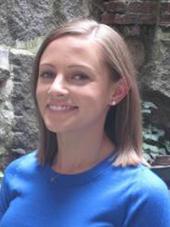-
About
- Departments & Offices
-
Academics
- Public Health
- Biomedical Sciences
- Physician Assistant
- Special Master’s (MBS)
-
Admissions & Financial Aid
- Tuition & Fees
-
Student Experience
-
- Student Resources by Program
- Academic & Student Support
- Wellness & Wellbeing
- Student Life
- Events & Traditions
-
-
Research
- Research Labs & Centers
- Tufts University-Tufts Medicine Research Enterprise
-
Local & Global Engagement
- Global Health Programs
- Community Engagement
Our Alumni: Deborah Mailand
"I realized public health, specifically, epidemiology, allowed me to combine my interests and skills in medicine, science, math, and community service."

I am a clinical trial project manager at MAVERIC (Massachusetts Veteran Epidemiology Research and Information Center), which is part of the Boston VA Healthcare System. In my role, I manage the progress of multi-site trials from the planning stage through data analysis and publication. At MAVERIC, we do large trials that are relevant to the veteran population, so our current projects include research on suicide prevention, lower limb amputation, diabetes, renal disease, and heart health—I am always learning something new. I also joined the VA Outreach Committee to help educate veterans and the community about the services and resources available at the VA. In this role, I help develop strategies for finding and enrolling veterans in VA healthcare, and I get to attend community events (e.g., Celtics games, car shows, etc.) as a VA ambassador.
What inspired you to pursue an MPH?
As a Tufts undergraduate student in the School of Engineering, I took an epidemiology course and a healthcare politics course as electives. I was introduced to field of public health for the first time that semester, and I thoroughly enjoyed what I was learning. At this point, I realized public health, specifically epidemiology, allowed me to combine my interests and skills in medicine, science, math, and community service. Knowing that I wanted to end up working with veterans, public health seemed like the perfect way to make a unique impact on the veteran population.
What drew you to the Tufts Program?
I took advantage of the BA/MPH program (or in my case, the BS/MPH program), so I was able to complete both my undergraduate and graduate degrees in 5 years. This was a significant time and money saver. I was also pleased with the small class sizes and overall small size of the program, which creates an intimate environment conducive to great discussions and close relationships with professors.
How did your Tufts degree help prepare you to work in the field?
By taking a variety of Tufts courses, I developed a wide knowledge base. It has truly surprised me how often the tidbits and pieces of wisdom from a course, even those outside of my concentration, have proven valuable in my work. In addition, many of my course projects and assignments allowed me to apply what I had learned to a real-life topic of interest, so I spent a lot of time as a student thinking about the veteran population and veteran issues. I know that has given me great background for my work and has propelled my VA career forward.
What advice do you have for prospective students?
My overall advice is to seek out any and all opportunities at Tufts—there are a lot! For example, sign-up to work the Tufts booth at the American Public Health Association’s annual meeting, take full advantage of the Applied Learning Experience (ALE), choose an interesting elective that is not necessarily related to your anticipated field, find a research project that you can be involved in, and so on. If you hear of, or are offered, an opportunity, go for it. You will not regret it!